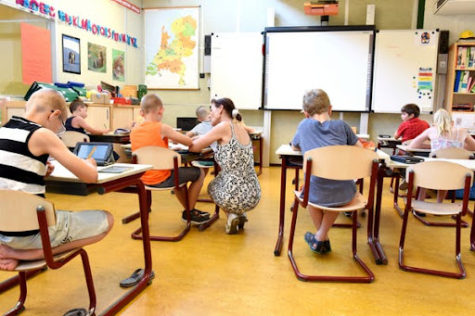Stress Kills Students’ Desire To Learn

(Photo Source: PEXELS)
October 26, 2022
Growing up, school teaches kids how tomanage their stress. But what does that mean, exactly? Why should kids be stressed?
Does this stress that goes undealt with affect kids’ learning? When asking fellow students and teachers at Pentucket, the answers they gave were truly eyes opening.
Freshman, Tey Turner says, “School stresses me out, because sometimes I feel like teachers give us too much work, and when it comes to sports and stuff, it becomes hard to balance both of them.”
Mr. Soule, a 9th grade science teacher, also states, “I absolutely get stressed from school! I feel like there are usually so many things to do and not enough time to do it.”
Both students and teachers get stressed out by school, and stress is not always easy to recognize. So can this stress spiral into bigger issues? How long can it go unrecognized? For example, Tey Turner’s stress in school started when she was in fifth grade. And for many others, it started way earlier.
Senior, Josi Dodge explains, “My stress in school started for me when I was in first grade, however, at the time, I didn’t know what I was experiencing was stress. I didn’t know if the feeling was my fault or someone else’s, and I didn’t find out it was stress until I was in middle school where they constantly tell you how to manage your stress.”
Dodge is one of many people who have struggled with stress from a young age, but how many children make an effort to get rid of this stress, or even know what it is in the first place?

There are many different ways to get stressed out by school. For example, factors such as the amount of workload a student is given compared to if teachers are meeting every student’s learning style, are different levels adds to kids’ stress. Therefore, many kids may not know why they get stressed. So how do teachers recognize and deal with stress in the classroom?
Algebra 1 and 2 teacher, Ms. Barlow explains, “I see various different levels of stress in the classroom. I see kids who always want to get everything right so they always question themselves, and then I have others who are struggling and won’t ask for help. Overall it really depends on the student. Some people have learnt to work with the stress, and others haven’t.”
Ms. Barlow has taught at Pentucket for 30 + years and has seen many students struggle with stress. In addition to that, she has witnessed her own kids struggle with stress in school as well. She explains how when her twin boys were in school, they reacted to stress differently. How one would shut down when stress came and the other one would find a way to tackle it. Along with Ms. Barlow, Mr. Soule also experiences a similar issue involving his kids and how they manage their own stress.
Mr. Soule states, “I have a son who’s in the 4th grade and he is kinda stressed out by school. He feels he’s not as smart as the other kids. Like he’s not getting the info as quickly as they do. I think he started having stress in first grade.”
Many teachers said that one of the most common things they see happen when a student is experiencing stress is to leave class. Whether it be to get a drink of water, go to the bathroom, or take a walk, students want to escape the situation.
When things get difficult, people have a fight or flight reaction, which causes people to be afraid of failure which leads them to lose the desire to learn. But in an environment where failure should be accepted, why does this happen?
Ms. Snow, a 8th grade English teacher proclaims, “I think there is a lot of pressure for young students in this day and age. Well, at least more than ten years ago when I was in high school. There is a lot of pressure from social media, parents, teachers, and afterschool activities that can stress a person out. It can hurt kids’ grades and mental health.”
The pressure and mental strain by the thought of having to go to college really takes a toll on students. There is so much more pressure put on kids to succeed, and now children are faced with the struggle between living the “best years of their life” and getting a proper education to use for the rest of their life.
When a person gets stressed, they can feel as if they are alone and are the only ones experiencing it. Therefore, it can be helpful for others to show that they get stressed too. Ms. Barlow perfectly demonstrates that in her classroom. In her room, Ms. Barlow constantly makes it a necessity to remind her students that everyone makes mistakes and, to calm down, all it takes is a couple of deep breaths. And if you know Ms. Barlow, she is famous for her ”Barlow blunders”, which is what she calls when she herself makes a mistake. She thinks that this way, students are able to feel like they are in a more calm and safe environment when making mistakes.

Despite the fact that Ms. Barlow fights to ease student stress, she herself also has stress in the classroom. Her stress in school started when she was in 7th grade and progressively stayed throughout her many years of teaching. The same way teachers recognize student stress, students also understand teacher stress.
Josi Dodge states, “I think teachers get stressed because They are teaching so many of us and not only they have to deal with their own problems and the issues of being a teacher, they have to take on our problems too.“
So at the end of the day, almost everyone gets stressed out by school, whether it be students or teachers. Hence, the only thing that can be done is to learn how to work with it. Though this may seem difficult, there are many tips that may help. Students and teachers shared their tips and their ways to minimize stress in and out of school.
Senior Josi Dodge states: “To help my stress, I play angry birds in between my classes, I also try to get my work in on time, and plan activities around school.”
Ms. Snow states: “To ease my stress, I do a lot of yoga and meditation. I make sure to spend time with my family, friends, and pets, and ultimately just try to keep work stuff at work and home stuff at home.”
Freshman Tey Turner states: “To ease my stress, I try to do something I love like a sport, in order to take my mind off of everything. I also try to mix in subjects I don’t like with subjects I do because it is easier for me to do subjects I like.”
Mr. Soule states: “I prevent my stress with organization. I love to have a plan, write down my plan, then follow through with my plan.”
Sophomore Lily McIntyre states: “To help my stress, I like to separate my work into pieces rather than tackling everything all at once.”
Sophomore Jake Rivers states: “I ease my stress by listening to music while I’m working. It is the most effective thing for me.”

youll never know • Jan 12, 2023 at 9:56 am
this is so inspiring nene